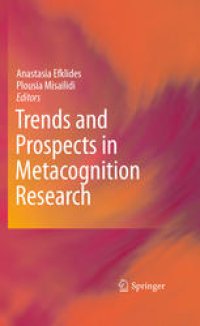
Ebook: Trends and Prospects in Metacognition Research
- Genre: Technique // Transportation: Ships
- Tags: Learning & Instruction
- Year: 2010
- Publisher: Springer US
- Edition: 1
- Language: English
- pdf
Trends and Prospects in Metacognition Research Anastasia Efklides and Plousia Misailidi, editors The mechanisms of metacognition—our knowledge of how we know—have yet to be fully explained, and its development in childhood has yet to be fully understood. Taking as its starting point the discussion about the roots of conscious and unconscious awareness, Trends and Prospects in Metacognition Research clarifies these processes—along with many others—in a stimulating attempt to unite disparate areas of research and theory. The book illuminates both familiar and less frequently studied metacognitive phenomena, bringing new methodologies and fresh challenges to long-held ideas about self-regulation and control, distinctions between cognition and metacognition, the social contexts of children’s learning and metacognition, and the trainability of metacognitive skills. In keeping with its integrative approach, basic and applied research are given equal emphasis as chapters examine research trends most likely to impact the future of the field, including the following: • Metacognition in non-human species. • Tip-of-the-tongue and blank-in-the-mind states. • Fringe consciousness. • Metamemory deficits in schizophrenia. • Metacognition, uncertainty, and confidence among young children. • Teachers’ use of metacognition in the classroom. • Metacognitive knowledge of decision making. Trends and Prospects in Metacognition Research offers researchers in psychology, education, and cognitive science vital new perspectives and insights into their work, with a keen eye toward the future of their rapidly evolving field.
Trends and Prospects in Metacognition presents a collection of chapters dealing principally with independent areas of empirical Metacogition research. These research foci, such as animal metacognition, neuropsychology of metacognition, implicit learning, metacognitive experiences, metamemory, young children's Metacogition, theory of mind, metacognitive knowledge, decision making, and interventions for the enhancement of metacognition, have all emerged as trends in the field of metacognition. Yet, the resulting research has not converged, precluding an integration of concepts and findings.
Presenting a new theoretical framework, Trends and Prospects in Metacognition extends the classical definitions offered by Flavell and Nelson to carry the prospect of more integrated work into the future. By opening the possibility to cross the boundaries posed by traditionally independent research areas, this volume provides a foundation for the integration of research paradigms and concepts and builds on the relationship between metacognition and consciousness, while integrating basic with applied research.